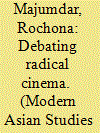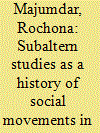|
|
|
Sort Order |
|
|
|
Items / Page
|
|
|
|
|
|
|
| Srl | Item |
| 1 |
ID:
112484


|
|
|
|
|
| Publication |
2012.
|
| Summary/Abstract |
This paper offers a history of the creation and development of film societies in India from 1947 to 1980. Members of the film society movement consisted of important Indian film directors such as Satyajit Ray, Ritwik Ghatak, Shyam Benegal, Basu Chatterji, Mani Kaul, G. Aravindan, Kumar Shahani, Adoor Gopalkrishnan, and Mrinal Sen, as well as film enthusiasts, numbering about 100,000 by 1980. The movement, confined though it was to members who considered themselves film aficionados, was propelled by debates similar to those that animated left-oriented cultural movements which originated in late colonial India, namely, the Progressive Writers Association in 1936, and the Indian People's Theatre Association in 1942. By looking at the film society movement as an early and sustained attempt at civil-social organization in postcolonial India, this paper highlights the two distinct definitions of 'good cinema'-from an aesthetically sophisticated product to a radical political text-that were debated during the time of the movement.
|
|
|
|
|
|
|
|
|
|
|
|
|
|
|
|
| 2 |
ID:
137261


|
|
|
|
|
| Summary/Abstract |
While there is a thriving sociological and historical literature on social movements in post-colonial India, popular mobilisations of the colonial period are rarely addressed in terms of social movements. But the historical record is replete with instances of countless mobilisations seeking change against the state and other forms of authority in colonial society. This essay analyses a select group of works by the historical collective, Subaltern Studies, with the explicit goal of seeing these works as histories of social movements in colonial India. It also argues that one of the lasting legacies of the collective's writings was to present us with a paradigm, not unchallenged, of the revolutionary subject of such movements. By focusing in particular on Ranajit Guha's early writings, I present a reading of the colonial Indian peasant as this paradigmatic rebel subject.
|
|
|
|
|
|
|
|
|
|
|
|
|
|
|
|
|
|
|
|
|